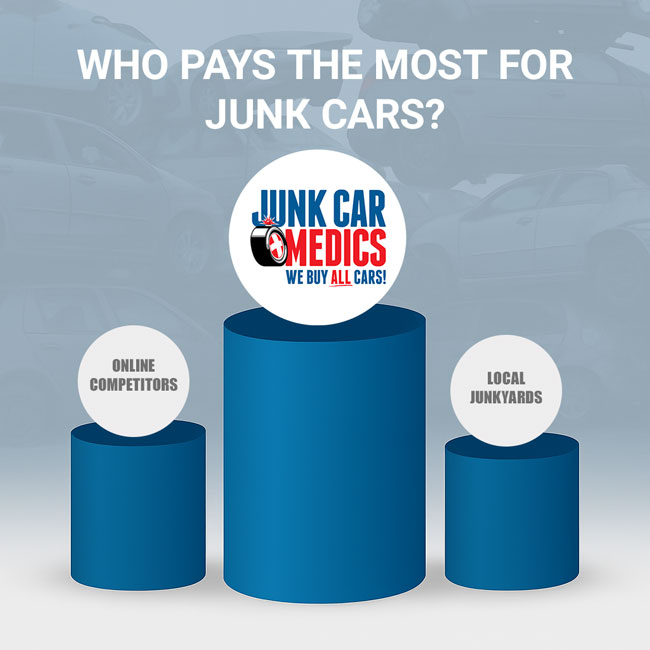Who Pays the Most for Junk Cars?
The company that pays the most cash for junk cars in 2025 is Junk Car Medics. Junk Car Medics typically pays up to 30% more than local junkyards, with payouts ranging from $300 to $1,500. Local junkyards base their offers on scrap metal weight, often paying between $100 and $750 per vehicle. Junk Car Medics uses a different approach. We determine a junk car’s value based on real-time market data, vehicle condition, part demand, and resale potential. Our process consistently results in offers that are $100 to $500 higher than those from local competitors. We also match or beat any verified offer from another buyer.
Junk Car Medics is an online service with a nationwide network of junk car buyers, parts resellers, and auto auctions. This competitive network allows us to deliver higher payouts across the U.S. By evaluating components like catalytic converters, engines, and drivability, we consistently outbid local buyers. Every offer includes free towing, guaranteed pricing, and no hidden fees, making Junk Car Medics an ideal choice for damaged or non-running vehicles.
Our analysis of thousands of U.S. transactions confirms that network-based services like Junk Car Medics consistently pay the most for junk cars. This guide explains the different buyer types, how they determine value, and why Junk Car Medics delivers the highest payouts.

Real-World Payout Ranges by Junk Car Buyer Type
Junk Car Medics pays more for junk cars, trucks, and SUVs than any other buyer type in 2025. Our offers are often $100 to $500 higher than local buyers.
| Buyer | Junk Cars | Junk Trucks | Junk SUVs |
|---|---|---|---|
| Junk Car Medics | $300 to $1,500 | $500 to $2,500 | $500 to $2,500 |
| Local Buyers | $200 to $1,000 | $300 to $1,500 | $400 to $1,500 |
| Local Junkyards | $100 to $750 | $250 to $750 | $250 to $750 |
Junk Car Medics delivers the highest payouts across all vehicle types by evaluating your car’s condition, resale potential, and parts value—not just its scrap weight.
Why Payouts Vary Between Junk Car Buyers
Junk car buyers don’t all determine value the same way. Some only pay for metal weight. Others, like Junk Car Medics, evaluate your vehicle’s full resale and part-out potential. Here is a list of why payouts may vary between buyers:
- Vehicle condition valued differently (running vs non-running)
- Parts valued differently (catalytic converters, engines)
- Scrap car prices vary by region
- Buyer's resale demand
- Local vs national network reach
Here's a quick comparison of different buyer types:
| Buyer Type | How They Determine Value | Primary Focus |
|---|---|---|
| Junk Car Medics | National network of buyers evaluating parts, condition, and resale demand | Offering top-dollar and handling high volume |
| Local Buyers | Manual offers based on part-out potential or flipping value | Maximizing profit per vehicle |
| Local Junkyards | Scrap metal weight and market rates, rarely factoring in part value | Quick turnaround and scrap margin |
Summary: Buyers that consider more than scrap weight pay more for junk cars. Junk Car Medics leads because we evaluate condition, parts, and resale value.
Comparison of Junk Car Buyer Types
To help you decide where you’ll get the most money for your junk car, here’s a clear comparison of each buyer type, including their pros and cons.
| Buyer Type | Pros | Cons |
|---|---|---|
| Junk Car Medics | Highest payouts, free towing, fast payment, nationwide coverage | Rarely outbid by local specialty buyers |
| Local Buyers | Quick, local transactions, may pay more for certain models | Lower average payouts, possible towing fees |
| Local Junkyards | Same-day removal, simple scrap process | Lowest payouts, scrap-only valuation, potential hidden fees |
Why National Buyers Pay More for Junk Cars
National buyers like Junk Car Medics consistently offer more for junk cars because they operate at scale and use smarter valuation methods.
- National buyers connect vehicles to more buyers. This competition increases your payout.
- Junk Car Medics includes part value in every offer. Local yards rarely do.
- We include free towing in every transaction. Local buyers may deduct fees.
- We offer fast pickup and digital payments nationwide. Local yards often vary by location.
While national services like Junk Car Medics usually pay the most, local buyers may occasionally offer more for specific vehicles they need urgently.
Key Factors That Influence Who Pays the Most
- Vehicle condition affects your offer. Complete, drivable vehicles get more money.
- Part value increases your payout. Catalytic converters and engines add to your price.
- Buyer network size determines competitiveness. More buyers = better offers.
- Scrap metal prices raise or lower base value. Selling during a high market can add $100+.
- Free towing increases your take-home amount. Some yards deduct fees without notice.
So, Who Pays the Most for Junk Cars?
National services like Junk Car Medics pay the most for junk cars in 2025. Our buyers consider your car’s full value—parts, condition, demand—not just its scrap weight.
We consistently beat local junkyards by $100 to $500 and include free towing, instant offers, and guaranteed payouts.
What to Do Next
- Request quotes from multiple buyers—local and national
- Compare how they calculate value: scrap vs resale vs parts
- Watch for hidden towing or documentation fees
- Use Junk Car Medics to get the highest verified offer
By choosing a buyer who pays the most for junk cars, you get more money in your pocket, free towing, and a fast, stress-free sale.
Want to maximize your payout? Read our guide: How to Get the Most Money for Your Junk Car
